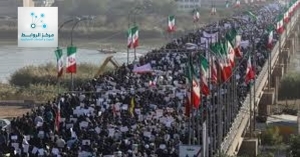Researcher Shatha Khalil *
Translated by : mudhaffar al-kusairi
The Iranian economy is heading for bankruptcy, a mass impoverishment of the population, and if the United States has really set the goal of changing the power and political system of the Islamic Republic of Iran, the situation is now working in its favor… The population in their current economic situation will support any external intervention, only to get rid of the “regime” and stop the frequent internal crisis and external expansion that drains Iran’s already debilitating economy.
A frightening statistic from within Iran confirms that the tragic economic situation and poverty presented by the member of the Shura Council of the Iranian regime Ali Qurbani on March 10, 2019, where inflation reached 43%, 12 million unemployed, and double the number of poor in Iran compared to last year.
More than 85% of retirees and more than 80% of Iran’s employees live below the poverty line.
A 98% increase in meat prices, as well as a 231% increase in the price of tomato paste, selling more than $ 700 billion of oil over the eight years in Iran.
Large differences between average wages:
In the same context, US Secretary of State Mike Pompeo said What Iran is going through not because of US sanctions, but rather mismanagement of the regime, not imposed sanctions.
He added that more than 80% of the current problems in the country are due to some cases of mismanagement, and that only 20% of them are affected by sanctions and external problems, “today social inequality and class difference between government employees and lack of care for retirees, have turned to the inconvenience for these citizens and their patient families when 85% of retirees live below the poverty line, it is painful for us and shameful, but most unfortunately a pensioner with a doctorate degree in one office receives a salary of 21 million toman , and another one with the same degree in another office will get two million toman. Are these unfair cases of discrimination considered justice?
In addition to the economic deterioration within the Iranian institutions, and the sagging of vital social sectors, which can not be separated from the mismanagement of wealth, and the regime prefers abroad at the expense of the interior now threatened by the largest repression that the regime may wage in defense of the interests of individuals, at the expense of Iranian groups , united by , hunger and pushed to the street , and what make matters worse, the Iranian government raised fuel prices by 50 percent.
The Iranian economic situation is in a state of escalating crisis, not only reflected in the high rates of unemployment and inflation, but in what the regime fears and expects , a state of public discontent in the Iranian street, especially among the middle class and young people in society, where many Iranian towns and cities are witnessing demonstrations demand an improvement in the deteriorating standard of living, which triggered angry protests in the Iranian street, and the people know that the government of his country and the Revolutionary Guards that control the joints of the state spend billions of dollars abroad in service of expansion projects and support for terrorism.
Iranian President Hassan Rouhani made the right decision at the wrong time… When we say that Mr. Rouhani chose the worst time to take this step to raise the price of gasoline that sparked the protests, we mean that Iran and its allies and influence in important neighboring countries such as Iraq and Lebanon face the street anger against Iranian influence and calls it to leave by force.
Hunger in Iran internally, offset by money laundering and terrorism support abroad:
According to a statement issued by the International Working Group (fatf), an international body monitoring money laundering and countering terrorism, Iran failed for the sixth time to implement key parts of the reform plan, and there were very few signs that Tehran was willing to abide by the agreement between the two sides where money and military equipment continued to be sent to many terrorist factions and movements, much of it transferred through the Iranian Revolutionary Guards, which have recently been subjected to US sanctions.
The international community’s statement states that Iran does not criminalize the financing of terrorism, nor does it identify or freeze the assets of terrorist groups in line with relevant UN Security Council resolutions, as well as failing to show how the authorities monitor and punish those who are carrying out illegal financial transfers.
On the level of internal poverty, an Iranian expert in the field of anti-poverty studies, said that alternative solutions such as distributing food rations or relying on donations and charity will not be feasible in this regard, noting that last year witnessed a successive increase in the proportion of the poor inside the country.
Among the consequences of these phenomena, serious social ones , including the widening gap between the classes, the high rates of bribes within government institutions, administrative corruption, in addition to the sale of human organs to secure life requirements, the proliferation of drugs in addition to the increase in family problems and the increase of poverty rates , that are linked to high commodity prices in the Iranian market, and the scarcity of other varieties due to scarcity of foreign exchange.
The expert added that the decline in the purchasing power of Iranian families and workers will also increase poverty rates, especially as consumer prices have risen by 50 percent since the start of the current Persian year on March 21, according to central bank figures.
From the above, we conclude that change in the heart of Tehran is the greatest guarantee of safe and positive change, not only inside Iran, but the whole of the Arab East.
Economic Studies Unit
Rawabet Center for Research and Strategic Studies

